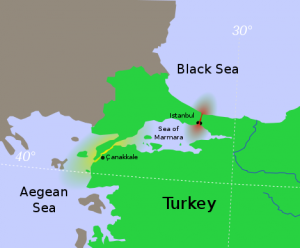Dardanelles Then, Afghanistan Now: Apples and Oranges

Writing in the Los Angeles Times, Professor Andrew J. Bacevich considered the war in Afghanistan against Churchill’s experience in World War I. Churchill, he says, looked for alternatives to “sending our armies to chew barbed wire in Flanders.” Just so. And we should be looking for alternatives to chewing dust in Afghanistan.
Bacevich describes Churchill’s alternative as “an amphibious assault against the Dardanelles.” (That is a physical impossibility.) Churchill championed a naval attack on the Dardanelles, followed by an amphibious assault on the Gallipoli Peninsula). Bacevich adds that Churchill wished to “support the infantry with tanks.” (I presume he means supporting the infantry on the Western Front with tanks, since they were not a factor on Gallipoli.)
But the Dardanelles/Gallipoli strategy, Bacevich continues
only prolonged the war and drove up its cost. Churchill and his Cabinet colleagues had spent four years dodging fundamental questions. Fixated with tactical and operational concerns, they ignored matters of strategy and politics. Britain’s true interest lay in ending the war, not in blindly seeing it through to the bitter end. This, few British leaders possessed the imagination to see. A comparable failure of imagination besets present-day Washington.
Why comparisons are inapt
Professor Bacevich writes thoughtfully. At minimum, a people that opt for war should pay the bills. They should not foist the debt onto their grandchildren. But the Churchill examples are not entirely appropriate.
1. To compare the butchery of World War I trench warfare with the casualties of Iraq/Afghanistan is silly. Every village in Britain, Alistair Cooke once reminded us, has its memorial to the fallen in the Great War. To say soldiers were decimated is perhaps an understatement. At many times, tragically, the losses were greater than one in ten.
2. Churchill’s Dardanelles adventure was an attempt to end the stalemate and slaughter on the Western Front. A success would have powerfully contributed to the Allied war effort. The premise was that the Fleet would sail through the Dardanelles and appear off Constantinople (Istanbul). This would force Turkey’s surrender and relieve the bottled-up Russians. That meant redoubling the forces deployed against Germany and Austria-Hungary. Churchill’s fault (as he later admitted) was trying to drive a cardinal operation without authority to direct every aspect of it. It was something he avoided in World War II.
3. The tank (which Bacevich rightly identifies as a Churchill concept) was never a factor early in World War I. Tanks were not used significantly until 1917, and then only briefly. They did ease the horrific carnage of “over the top” charges against entrenched artillery. That was salient feature that made World War I much worse in terms of human losses than World War II.
A better source of Churchill comparisons
Churchill drew many appropriate lessons applicable to the present war in Afghanistan much earlier. He wrote about the features of the terrain and the determination of the enemy in his first book, The Story of the Malakand Field Force. He also wrote presciently about the nature of Islam. No people, he concluded, were braver in battle, nor more easily misled by religious fanatics. The Middle East, he remarked in 1921, was
unduly stocked with peppery, pugnacious, proud politicians and theologians, who happen to be at the same time extremely well armed and extremely hard up.







2 thoughts on “Dardanelles Then, Afghanistan Now: Apples and Oranges”
On reflection, I think you are right, and have amended that line accordingly.
The notion that “…Churchill’s Dardanelles adventure was an attempt to end World War I—and might have, had it succeeded.” was probably the most ludicrous thing I’ve ever read…
Comments are closed.